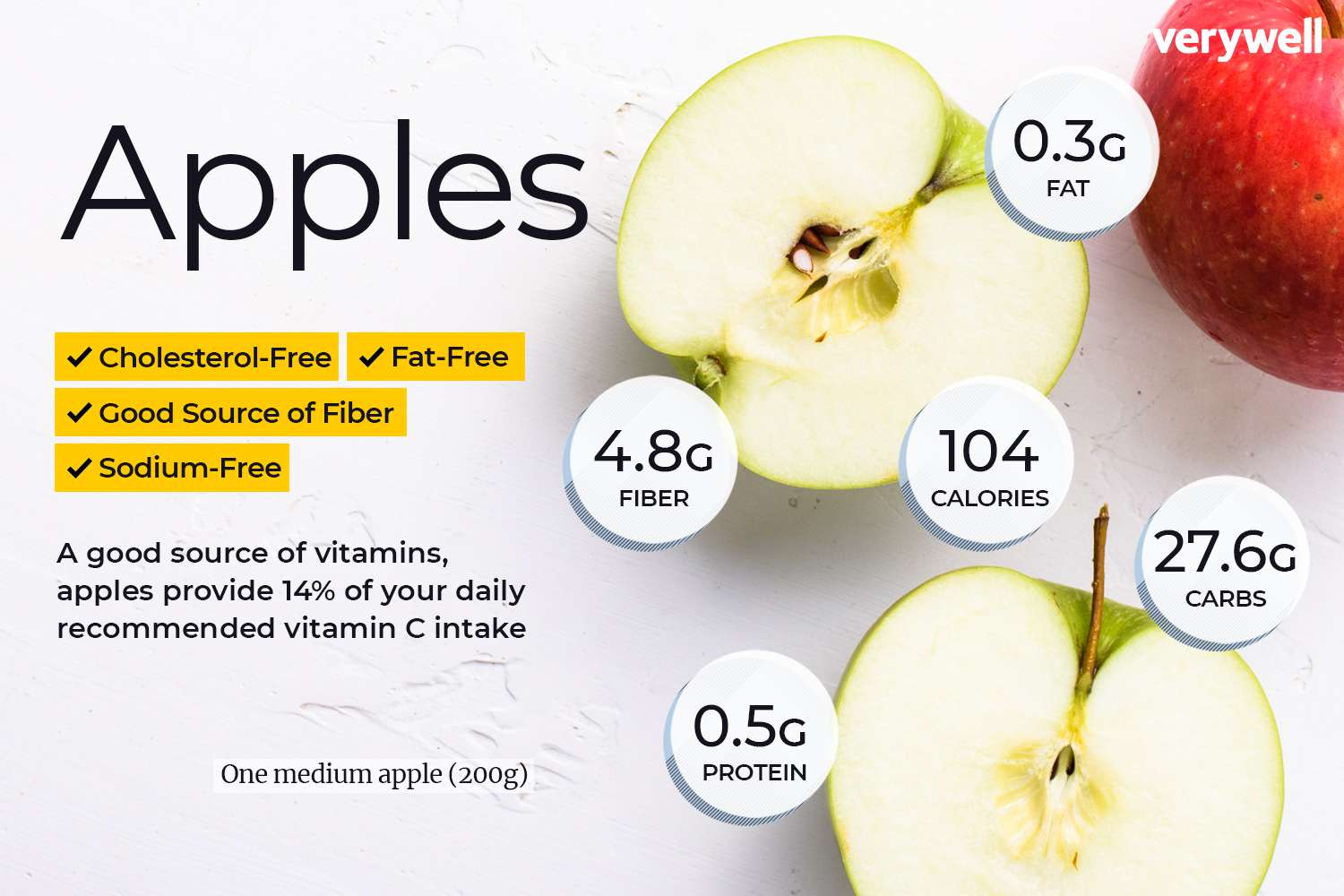The Nutritional Powerhouse of Fuji Apples: Unveiling the Health Benefits and FAQs
Fuji apples are a popular and widely consumed variety of apple known for their crisp texture and sweet flavor. They originated in Japan in the late 1930s as a cross between two American apple varieties, the Red Delicious and the Ralls Janet. Since then, Fuji apples have gained global popularity and are now cultivated in various regions around the world.

Fuji apples are highly versatile and can be enjoyed in various culinary applications. They are often eaten fresh, added to salads, used in baking, or even juiced for a refreshing beverage. The combination of their appealing taste and texture makes them a favorite among apple lovers.
Macronutrients in Fuji Apples
Fuji apples are a nutrient-rich fruit that provides a range of macronutrients essential for a healthy diet. They are primarily composed of carbohydrates, which serve as a vital source of energy for the body. Additionally, Fuji apples contain small amounts of proteins, which are crucial for building and repairing body tissues. However, they are low in fat content, making them a healthy choice for those watching their fat intake.
The carbohydrates in Fuji apples consist mainly of natural sugars, such as fructose, which provide a quick source of energy. These sugars are accompanied by dietary fiber, which helps regulate blood sugar levels and promotes healthy digestion.
Micronutrients in Fuji Apples
Fuji apples are packed with essential micronutrients that contribute to overall health and well-being. They are an excellent source of vitamin C, which plays a crucial role in boosting the immune system, promoting collagen synthesis, and supporting wound healing. Vitamin A is also present in Fuji apples, contributing to healthy vision and supporting cellular growth and development.
In addition to vitamins C and A, Fuji apples contain various B vitamins, including thiamin, riboflavin, niacin, pyridoxine, and folate. These B vitamins are involved in energy production, brain function, and the formation of red blood cells. They play a vital role in maintaining overall health and vitality.
Antioxidants and Phytochemicals in Fuji Apples
Fuji apples are rich in antioxidants and phytochemicals, which are powerful compounds that contribute to their health benefits. Antioxidants help neutralize harmful free radicals in the body, reducing the risk of chronic diseases such as heart disease, cancer, and neurodegenerative disorders.
Specific antioxidants found in Fuji apples include quercetin and various flavonoids. Quercetin is known for its anti-inflammatory properties and potential to reduce the risk of allergies, while flavonoids have been linked to cardiovascular protection and improved cognitive function.
Fiber Content and Digestive Health
Fuji apples are an excellent source of dietary fiber, which plays a crucial role in maintaining digestive health. They contain both soluble and insoluble fiber. Soluble fiber helps regulate cholesterol levels and stabilizes blood sugar levels, while insoluble fiber adds bulk to the stool, promoting regular bowel movements and preventing constipation.
In addition to promoting digestive health, the fiber in Fuji apples can also aid in weight management by providing a feeling of fullness and reducing overeating. Furthermore, the fiber content in Fuji apples helps slow down the digestion and absorption of sugars, making them a suitable choice for individuals with diabetes or those looking to manage their blood sugar levels.
Frequently Asked Questions
Are Fuji apples low in calories?
Yes, Fuji apples are relatively low in calories. A medium-sized Fuji apple contains approximately 95 calories, making it a healthy snack option.
Can Fuji apples help with weight loss?
Yes, Fuji apples can aid in weight loss due to their high fiber content and low-calorie content. The fiber in Fuji apples helps promote feelings of fullness, reducing the likelihood of overeating. Additionally, their natural sweetness can satisfy cravings for sugary snacks, making them a healthier alternative.
Are Fuji apples a good source of vitamin C for boosting the immune system?
Absolutely! Fuji apples are an excellent source of vitamin C, which is known for its immune-boosting properties. Vitamin C helps strengthen the immune system, promotes the production of white blood cells, and acts as an antioxidant, protecting cells from damage caused by free radicals.
Do Fuji apples contain any allergens?
Fuji apples are generally well-tolerated and not commonly associated with allergies. However, individuals with known allergies to apples should exercise caution and consult with a healthcare professional before consuming Fuji apples or any other apple variety.
Can eating Fuji apples improve digestion?
Yes, the high fiber content in Fuji apples promotes healthy digestion. The combination of soluble and insoluble fiber helps regulate bowel movements, prevent constipation, and support overall digestive health.
Are there any specific health benefits associated with the skin of Fuji apples?
The skin of Fuji apples contains additional fiber and a higher concentration of antioxidants compared to the flesh. These antioxidants, including flavonoids and polyphenols, contribute to various health benefits such as reducing inflammation, protecting against chronic diseases, and promoting heart health. However, it is important to wash the apples thoroughly before consuming to remove any potential contaminants.
Can Fuji apples be included in a diabetic-friendly diet?
Yes, Fuji apples can be a part of a diabetic-friendly diet. The fiber in Fuji apples helps regulate blood sugar levels and slows down the absorption of sugars into the bloodstream. However, it is essential for individuals with diabetes to monitor their overall carbohydrate intake and consult with a healthcare professional to determine the appropriate portion sizes.
Are Fuji apples suitable for individuals with gluten intolerance?
Yes, Fuji apples are naturally gluten-free and can be enjoyed by individuals with gluten intolerance or celiac disease. They are a healthy and safe option for those following a gluten-free diet.
Can Fuji apples help reduce the risk of certain cancers?
While no single food can guarantee the prevention of cancer, a diet rich in fruits and vegetables, including Fuji apples, is associated with a reduced risk of certain types of cancer. The antioxidants and phytochemicals present in Fuji apples have been studied for their potential anti-cancer properties. However, it is important to maintain a balanced diet and follow other cancer prevention guidelines recommended by healthcare professionals.
Are there any potential side effects of consuming Fuji apples?
Fuji apples are generally safe for consumption and do not have any significant side effects. However, some individuals may experience digestive discomfort or bloating if they consume large quantities of apples or have a sensitivity to certain compounds present in apples. As with any food, it is always advisable to consume Fuji apples in moderation and listen to your body’s response.
Conclusion:
Fuji apples are not only delicious but also a nutritional powerhouse. They provide a range of macronutrients, including carbohydrates and proteins, as well as essential micronutrients like vitamins C and A. The antioxidants and fiber content in Fuji apples contribute to their numerous health benefits, such as boosting the immune system, supporting digestive health, and reducing the risk of chronic diseases. Whether you enjoy them fresh, in salads, or as a snack, Fuji apples are a versatile and nutritious addition to your diet. Remember to consult with a healthcare professional for personalized dietary advice and to ensure Fuji apples fit into your specific health needs and goals.




